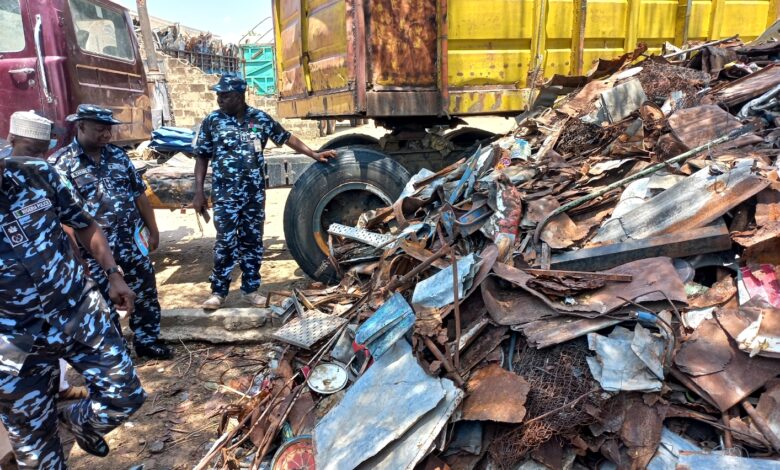Landmine Deaths Resurge In Northeast Nigeria Amid Insurgents’ Mass Surrender Claims
Within the past week, at least 13 farmers and six children have been killed in two separate landmine incidents in Borno, Nigeria.

A peaceful Saturday afternoon in Gubio, located in Borno State in North East Nigeria, was interrupted by an explosion that tragically took the lives of the town’s most vulnerable residents – its children.
At approximately 2 p.m. on Jan. 27, a devastating blast from an improvised explosive device (IED) tore through the air near a local Qur’anic school, resulting in the deaths of six pupils.
Unknown to a local metal scavenger, among the scraps he had collected was a lethal remnant of conflict – an unexploded IED.
Modu Bulama, a local security vigilante operative in Gubio, relayed the heartbreaking details to HumAngle.
“An IED was inadvertently picked and kept among the collected scrap metal,” Bulama explained, his voice laced with sorrow. “Somehow, it detonated today, causing a devastating explosion that severely harmed the children in the nearby area.”
According to Bulama, those in the business of scrap metal sales can only buy and stockpile them because the Borno State Governor, Babagana Zulum, had previously banned metal scavenging in July 2023, citing the risks of insurgent attacks and the potential dangers posed by undetected explosives. Despite this, the lure of potential income proved too strong for some who still do the business secretly, leading to consequences as tragic as they were preventable.
The then-executive chairman of Gubio’s local government area, Mali-Gubio Mali, spoke of the victims with a heavy heart. The sad incident happened days before the end of his tenure.
“Most of the victims were Almajiris,” he said, referring to the young students who attend the Quranic school. Expressing his deep regret over the incident, Mali added, “We are working tirelessly to determine what led to these terrible killings by IEDs in the area.”
This tragic event is not an isolated case, as Northeast Nigeria has been plagued by the scourge of IEDs for years. Just four days after, on Jan. 29, another blast on the Pulka/Firgi road in Gwoza Local Government Area claimed the lives of thirteen individuals, further highlighting the deadly tactics insurgents use to instil fear and disrupt communities.
These incidents are stark reminders of the fragile security situation in the region, where armed groups such as Boko Haram and the Islamic State West Africa Province (ISWAP) continue to pose a significant threat despite military efforts to control their activities. The military efforts have led to mass surrender. Civilians, particularly children, have become the inadvertent victims of a conflict that shows little sign of abating.
“The prevalence of unexploded ordnances (UXOs) in the region has had a profound impact not only on the safety of its inhabitants but also on their way of life,” Group Captain SG Shehu, retired, of Conflict and Security Development Consult (CSDC) Ltd, said while presenting an alarming statistics at the Stakeholders Engagement on Current Security Challenges in the North East Geo-political Zone of Nigeria that held in Maiduguri on Thursday, Feb. 1.
Group Captain Shehu said between 2016 and 2022, UXOs have so far caused “755 civilian deaths and 1,321 injuries”, highlighting the enduring threat these remnants pose.
He said the pervasiveness of UXOs has disrupted access to essential services and socio-economic activities and hindered the safe return of displaced populations. “In 2022 alone, 223 civilians fell victim to these explosives.
Efforts to quell the threats
To combat this threat, the North East Development Commission (NEDC) has conducted Mine Risk Awareness Training, teaching 540 liaison officers to inform their communities about the dangers of landmines and other explosive remnants.
International organisations, including the United Nations Mine Action Service and the International Committee of the Red Cross, have joined local efforts to address the challenges posed by UXOs.
HumAngle learnt from Group Captain Shehu’s presentation that there was a training in 2020 on Mine Risk Awareness for 90 participants each from six local government areas of Borno, Adamawa, and Yobe. In Borno, participants from Gwoza, Jere, MMC, Konduga, and Mafa were trained for the exercise.
“In 2021, Mine Risk Awareness Training was also carried out in Adamawa state for 30 participants, each from Mubi South, Mubi North, Michika, Madagali, Gombi and Fufore LGAs.
The same training was replicated in 2022 to 30 participants each from the six LGAs of Yobe State comprising Geidam, Gujba, Potiskum, Fune, Damaturu, and Nguru Local Government Areas.”
Despite this training, the bombs continue to go off from many unknown locations, causing fatal injuries to harpless citizens.
Group Captain Shehu said one of the best ways of mitigating the worsening trend is to expand mine risk awareness and explosive ordnance risk education in the confirmed hazardous areas in 17 local government areas of the BAY states.
He also advocated that Community volunteers be trained by the CSO Explosive Ordnance Resistance Education (EORE) Instructors as facilitators in their LGAs.
“We also need a robust mass media campaign through radio messaging, recording hazardous areas, survey and clearance, and above all, the establishment of a National Mine Action Centre,” the retired military officer said.
Borno governor, Babagana Zulum, had recently lamented that the resurgence of IED attacks has the potential of slowing down his post-insurgency reconstructions and resettlement efforts, even as he said it was a calculated attempt to sabotage his government.
Support Our Journalism
There are millions of ordinary people affected by conflict in Africa whose stories are missing in the mainstream media. HumAngle is determined to tell those challenging and under-reported stories, hoping that the people impacted by these conflicts will find the safety and security they deserve.
To ensure that we continue to provide public service coverage, we have a small favour to ask you. We want you to be part of our journalistic endeavour by contributing a token to us.
Your donation will further promote a robust, free, and independent media.
Donate HereStay Closer To The Stories That Matter




